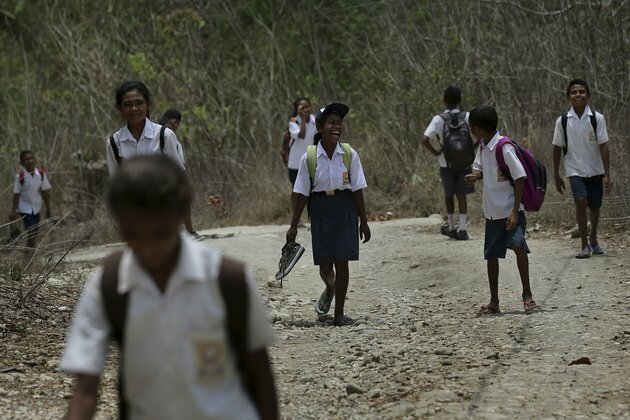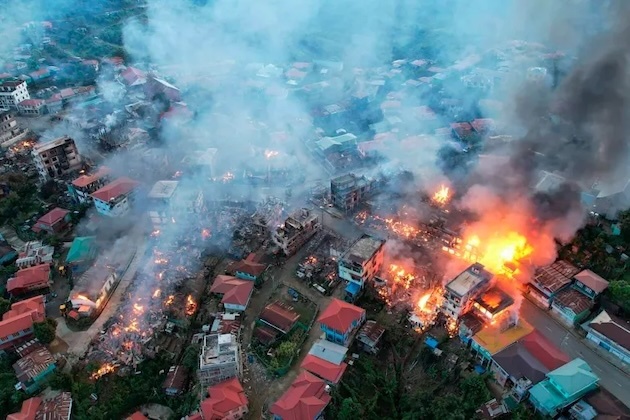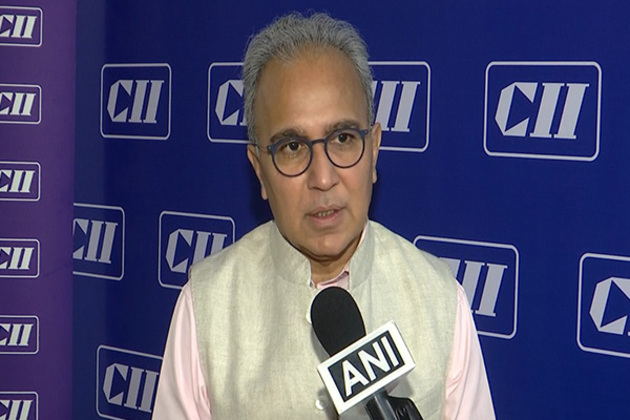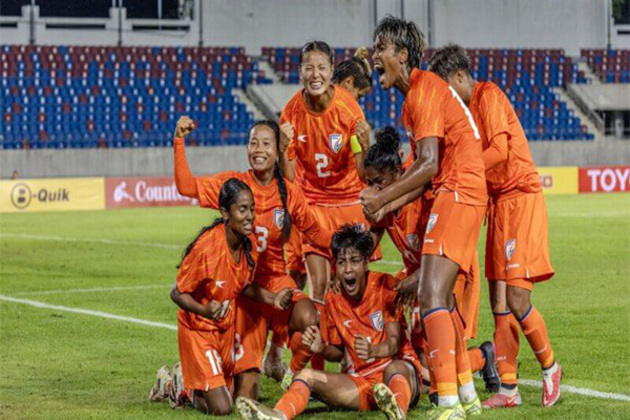Indonesia Education Lags Behind Region
Voice of America
16 Dec 2019, 20:05 GMT+10

JAKARTA, INDONEISA - Indonesian students are among the lowest performers in Southeast Asia, according to a recent report, The Program for International Student Assessment (PISA), released this month by the Organization for Economic Cooperation and Development (OECD). Indonesian 15-year-olds ranked in the bottom ten across 79 surveyed countries in all three subjects under consideration: math, reading, and science. The results point to education quality issues in the region's most populous country.
"It's a wake-up call for all of us in the education sector," said Totok Amin Soefijanto, a policy expert at Paramadina University in Jakarta.
Imperfect incentives
Indonesia's so-called demographic dividend, meaning its proportionally large youth population in a country of over 260 million, holds considerable potential for economic growth, but it is diminished by its low educational achievement to date.
Poorly qualified teachers are a major problem. Sixty-five percent of students surveyed by PISA said their teachers rarely provided direct feedback to them. One in five teachers are regularly absent, according to the World Bank in 2017. The government has run teacher competency tests and in 2015, the average score for the nearly three million teachers who took it was 53 percent, according to an analysis by University of Melbourne professor Andrew Rosser.
"We have not repeated the competency assessment since 2015, which I think was another one of our mistakes, because if we don't measure this, we don't know where their skills are decreasing," said Soefijanto.
Indonesian teachers also face chronically low salaries and are often appointed on the basis of cronyism or favor-trading, according to Rosser, which further decreases their competency.
Decentralization has been another challenge for improving education. Under the authoritarian regime of military general Suharto from 1965 to 1998, the school system was highly centralized. But after the regime ceded to a full democracy, Jakarta slowly yielded control of educational policy to regional governments. Given Indonesia's geographic reach of over 15,000 islands, this spread has made it difficult to enforce things like standard curricula or teacher qualifications.
"We also have challenges when it comes to geographic inequities, as we have a lot of remote areas in the country," said Jakarta-based social worker and activist Ryan Febrianto. "It's a big country that has a lot of administrative areas, languages, and cultures, so what's important is to develop policies that can accommodate that."
Some recent advances
The OECD report itself notes that last year's country results "must be seen in the context of the vast strides that Indonesia has made in increasing enrolment." From 2001 to 2018, the PISA sample coverage leaped from 46 percent to 85 percent of 15-year-old students. According to the report's authors, when accounting for the weakness of new entrants into a school system, the fact that Indonesia's results have been relatively stable over this period actually indicates that "Indonesia has been able to raise the quality of its education system."
Indonesia's high-profile education minister, Nadiem Makarim, former CEO of the influential ride-hailing startup Go-Jek, told Indonesian newspaper Kompas that the PISA results "should not be packaged as good news" and called for a "paradigm shift" in educational standards. He announced this week that the country's National Examination would be revamped as a Minimum Competency Assessment that tests students on math and literacy skills.
Weak core subjects
Math was a particularly sore subject for Indonesian students, with only one percent of them performing at the highest levels, compared to 44 percent in mainland China and 37 percent in Singapore, according to the report. The World Bank has also claimed that 55 percent of Indonesians who complete school are functionally illiterate.
In recent years, some resources have been redirected from core subjects to religious studies. Almost two-thirds of the country's secondary schools are private and the majority (about 90%) of them are Islamic in nature. Students at religious boarding schools typically score lower than students at nonreligious schools on exams, according to one 2017 study.
It is worth noting that Indonesia may not lack absolute resources to fund education, but rather that its allocation deserves further review. The country spent about 3.6 percent of its GDP on education in 2015, somewhat lower than regional neighbors like Malaysia and Vietnam, but in accordance with a constitutional mandate to spend 20 percent of its national budget on education.
"In recent years, I think the government has been focusing on maintaining and improving enrollment levels as well as improving school facilities... but we [still] have issues in terms of quality improvement," said Febrianto.
There is much low-hanging fruit for Indonesia's education budget in coming years, from incentivizing absentee teachers to fine-tuning its domestic national examinations. In the meantime, there is one area in which Indonesian students already score undeniably high: 91 percent of them reported "sometimes or always feeling happy," a full six points higher than the global average.
 Share
Share
 Tweet
Tweet
 Share
Share
 Flip
Flip
 Email
Email
Watch latest videos
Subscribe and Follow
Get a daily dose of Malaysia Sun news through our daily email, its complimentary and keeps you fully up to date with world and business news as well.
News RELEASES
Publish news of your business, community or sports group, personnel appointments, major event and more by submitting a news release to Malaysia Sun.
More InformationSoutheast Asia
SectionTrump signals progress on India Trade, criticizes Japan stance
WASHINGTON, D.C.: President Donald Trump says the United States could soon reach a trade deal with India. He believes this deal would...
UN Demands End to Myanmar Violence as Junta’s Election Plans Risk Further Instability
Nearly three months after a devastating earthquake struck Myanmar, the country remains trapped in a deepening crisis, compounded by...
Industry ready if US trade deal doesn't materialise: CII President
By Shailesh Yadav New Delhi [India], July 6 (ANI): Indian industry is prepared for any outcome regarding the proposed bilateral...
Pashtuns commemorate Gilaman Wazir on his first death anniversary
Washington DC [US], July 6 (ANI): The Pashtun Tahafuz Movement-United States (PTM-USA) has launched a sweeping nationwide mobilization...
Earthquake of magnitude 3.5 hits Nepal
Kathmandu [Nepal], July 6 (ANI): An earthquake of magnitude 3.5 hit Nepal on Sunday morning, as reported by the National Center of...
Etched in history: Blue Tigresses secure AFC Women's Asian Cup qualification for first time
Chiang Mai [Thailand], July 6 (ANI): India earned a gritty 2-1 victory against hosts Thailand, sealing their qualification for the...
Business
SectionMeta hires SSI CEO Gross as AI race intensifies among tech giants
PALO ALTO/TEL AVIV: The battle for top AI talent has claimed another high-profile casualty—this time at Safe Superintelligence (SSI),...
Engine defect prompts Nissan to recall over 443,000 vehicles
FRANKLIN, Tennessee: Hundreds of thousands of Nissan and Infiniti vehicles are being recalled across the United States due to a potential...
Microsoft trims jobs to manage soaring AI infrastructure costs
REDMOND, Washington: Microsoft is the latest tech giant to announce significant job cuts, as the financial strain of building next-generation...
Stocks worldwide struggle to make ground Friday with Wall Street closed
LONDON UK - U.S. stock markets were closed on Friday for Independence Day. Global Forex Markets Wrap Up Friday with Greeback Comeback...
Nvidia briefly tops Apple’s record in AI-fueled stock rally
SANTA CLARA, California: Nvidia came within a whisker of making financial history on July 3, briefly surpassing Apple's all-time market...
ICE raids leave crops rotting in California, farmers fear collapse
SACRAMENTO, California: California's multibillion-dollar farms are facing a growing crisis—not from drought or pests, but from a sudden...













